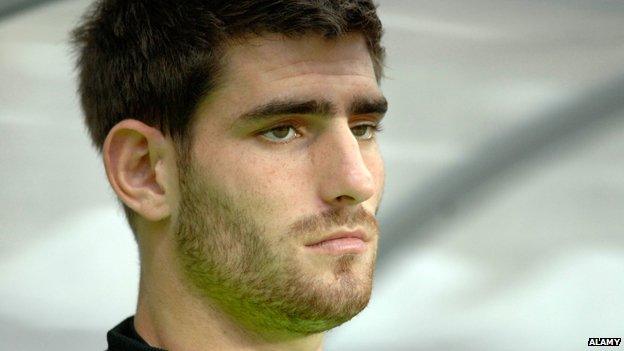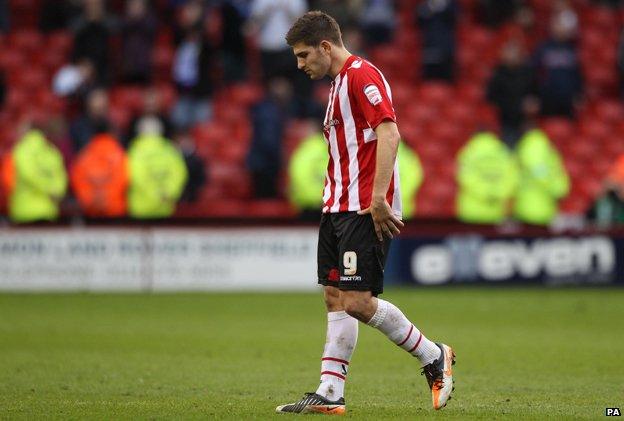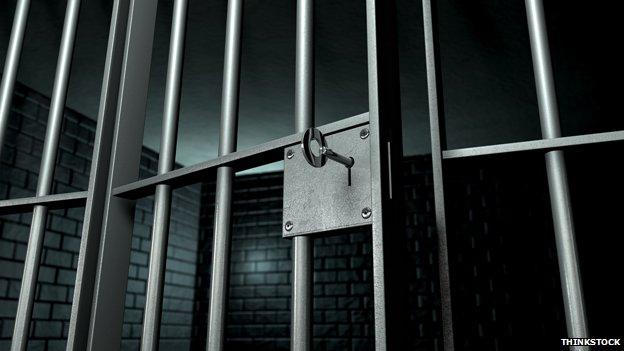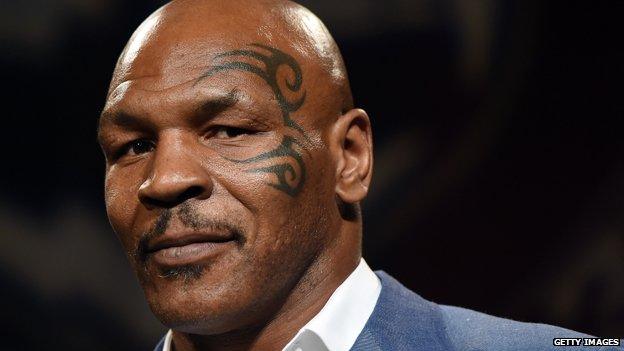What difference would it make if Ched Evans said sorry?
- Published

Fresh protests have erupted over Ched Evans's return to football after serving two-and-a-half years in jail for rape. Despite intense pressure, Oldham Athletic's sponsors say the club is signing him. Some argue that before he is allowed to play again professionally he should apologise. What would it mean if he did?
Ched Evans is a convicted rapist. He continues to protest his innocence. He is unrepentant.
A promising young striker prior to his conviction in 2012, Evans has been the focus of angry protests whenever it has been suggested he might return to the game - at his former club Sheffield United, at Hartlepool, and now at Oldham.
He was convicted of the rape of a 19-year-old woman who was estimated to be two-and-a-half times over the drink-drive limit and unable to give consent.
There's one overarching factor cited by virtually all of his critics - the failure to say sorry.
Labour leader Ed Miliband said, external he would not sign Evans because "he hasn't shown remorse". The player's "lack of remorse and failure to acknowledge his offence" disqualified him from the game, added, external Greater Manchester police and crime commissioner Tony Lloyd.

The player's inability to display "even a modicum of regret" for his behaviour disbarred him from football, wrote Rowan Pelling in the Daily Telegraph, external. Similarly, former Sports Minister Richard Caborn argued, external in October that Evans should only be given a second chance if "he publicly apologises", or if an appeal against his conviction were to succeed.
An online petition, external urging Oldham not to sign Evans so long as "he still refuses to acknowledge his guilt, apologise to his victim" and admit to fans "that what he did was wrong" has attracted more than 50,000 signatures.
Of course, there's a very simple reason why Evans has not apologised.
He maintains his innocence, and although he has been refused leave to appeal, an investigation is under way by the Criminal Cases Review Commission into his conviction. His family have set up an extensive website dedicated to clearing his name.
Even notwithstanding the question of his guilt, he has not apologised to his victim for the distress he has caused her. She has reportedly been driven from her house five times, external as a result of harassment from Evans's supporters. She has been vilified on social media and in 2012 nine people were fined for naming her in breach of a court order. Her father has said she was "living her life on the run" and had to spend Christmas apart from her family as "it's too risky for her to visit".
The only person to whom Evans has said sorry is his girlfriend Natasha Massey, for having been unfaithful to her.

More from the Magazine

Ched Evans's return to football has been met with a storm of protest. But how should rapists be treated when they leave jail? - What should happen to a released rapist? (November 2014)

But for now he remains, in the eyes of the law, a rapist. And for many that remains incompatible with playing football as long as he fails to apologise.
It isn't simply a moral question. According to criminologist David Wilson, a former prison governor who has worked with sex offenders, acknowledgement of culpability is absolutely key to making rehabilitation work.
It would be entirely right for Evans to return to football "if he had acknowledged his guilt, if he had completed the required sex offender treatment programmes, if he developed an understanding of why what he did was wrong", says Wilson, a former vice-chair of the Howard League for Penal Reform.

The case
Ched Evans was jailed for five years for raping a 19-year-old woman, while another player, Clayton McDonald, was cleared
The court heard McDonald met the woman and took her back to a hotel room near Rhyl, Denbighshire, sending a text to Evans stating he had "got a bird" or words to that effect
The jury heard that Evans had gone to the hotel, let himself in to McDonald's room and watched his friend and the woman having sex before taking part himself. The prosecution claimed that while the attack happened, friends of the footballer watched through a window
The men admitted having sex with the woman on 30 May 2011, but said it was consensual
In sentencing Evans, the judge said: "CCTV footage shows, in my view, the extent of her intoxication when she stumbled into your friend. As the jury have found, she was in no condition to have sexual intercourse"

But Wilson adds: "Unless a convicted sex offender admits their guilt, there is absolutely nothing you could do with them in terms of treatment programmes."
Not everyone agrees with this point of view.
There are Evans's supporters, many of whom vocally protest his innocence.
On the other hand, there are those who say that he should never play football again, external, apology or no apology. That the abhorrence of the crime of which he was convicted disqualifies him from professional sport forever. That footballers are supposed to be role models. That his presence on the pitch reinforces a "rape culture" in which sexual violence is normalised.
"If he did apologise, it would be too little too late," says Jill Saward, who has campaigned for victims since she was raped at her vicarage home in Ealing, west London, in 1986.
The problem is not that Evans has not said sorry, she says. It's that he appears genuinely to believe he has not committed a crime.
"He doesn't want to change because he doesn't think he's done anything wrong. It's a fact that it's a very high-profile role. He would be there in people's faces."
To Evans's victim - whose repeated harassment is, Saward says, a direct result of Evans's protestations of innocence - this would be extremely upsetting, and many other survivors of sexual violence would find it distressing, too.

Mike Tyson returned to the boxing ring after serving a prison sentence for rape
Evans would not, of course, be the first to return to front-line sport following a rape conviction. Mike Tyson resumed his career as a boxer after he was jailed for the crime - a crime of which he, too, continues to insist he is innocent, external.
Other footballers have picked up their careers in the wake of prison sentences.
Marlon King resumed his career after he was jailed on separate occasions for groping and punching a woman in the face, and receiving stolen goods, and convicted of a series of other offences. He is currently serving a prison sentence for dangerous driving.
Graham Rix managed Portsmouth, Oxford and Hearts after he was convicted of having sex with an under-age girl. Lee Hughes and Luke McCormick both returned to football after they were jailed for causing death by dangerous driving.
With these precedents in mind, there are those who argue, external that, however vile his crime, Evans has already paid a hefty price for it and should be allowed to return to football. That rehabilitation is possible without repentance.
While it may be difficult to extend forgiveness to someone who is defiantly unrepentant, believes Richard Garside, director of the Centre for Crime and Justice Studies, it's more important to tackle the sexist attitudes within football and wider society that shaped Evans rather than focus on one individual.
"He was found guilty and a prison sentence was his punishment, not unemployment," says Garside. "That was not part of his sentence and nor should it be."
His sentence has not yet, however, been completed. Evans is still on licence, and as such still serving his punishment.

Ex-offenders and employment law
In England and Wales, prison sentences under four years are "spent" after a certain period of time, and do not need to be revealed to potential employers
Certain offences - including rape - prevent ex-offenders from doing jobs known as "regulated activity"; this includes teaching, social work, and posts which involve working with children or vulnerable adults
Other jobs, including accountant, solicitor or vet, require an enhanced criminal record check from the Disclosure and Barring Service; employers have the discretion to refuse to employ an ex-offender

Having signed the sex offenders register, he must report to the police every year giving information about his bank details and if he has a person under 18 in his house. He needs the permission of his probation officer to travel abroad, a condition of release that prevented a rumoured move to Maltese side Hibernians.
Whether or not he returns to football, he will be prevented from work deemed "regulated activity" and jobs such as teaching, social work or health care that would involve working with children or vulnerable adults.
Regardless of what happens to his career, Evans will never, in truth, be free of the crime for which he was convicted.
Subscribe to the BBC News Magazine's email newsletter to get articles sent to your inbox.